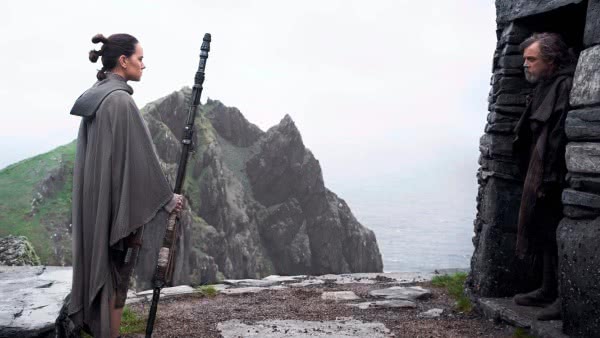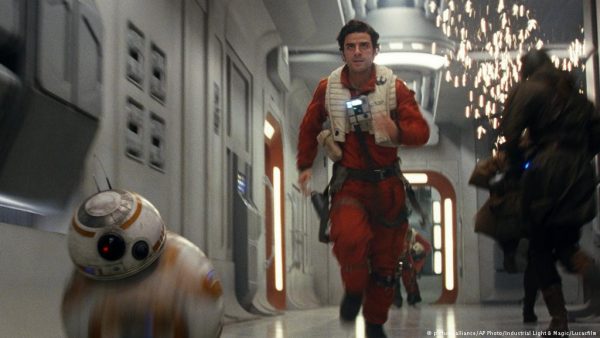Star Wars Episode VIII: The Last Jedi Review
“Star Wars: The Force Awakens” reacclimatized fans to a long time ago in a galaxy far, far away by paying homage to decades of tradition, reuniting us with old friends and building a foundation for “the next generation.” This blueprint presented Lucasfilm and “Episode VIII” filmmaker Rian Johnson (“Brick,” “Looper”) with an opportunity in “Star Wars: The Last Jedi” — continue to tread lightly and keep the biggest sci-fi/fantasy franchise of all time close to its roots, or jump to hyperspace in a bold new direction. Well, just as there must be balance to the Force, Johnson finds a balance between these options.
“The Last Jedi” sees new heroine Rey (Daisy Ridley) trying to persuade the previously missing Luke Skywalker (Mark Hamill) to teach her the ways of the Force, while General Leia Organa (Carrie Fisher) and Commander Poe Dameron (Oscar Isaac) lead the Resistance in a desperate bid to evade the First Order and keep some hope alive for the galaxy. This premise definitely allows for “The Last Jedi” to re-create “The Empire Strikes Back” to a degree, but critics of the “The Force Awakens” that belittled it for its similarity to “A New Hope” will find somewhat of the opposite to be true of “The Last Jedi.”
The film definitely contains “Star Wars” hallmarks and allusions to the experiences of watching films such as “The Empire Strikes Back” and “Return of the Jedi.” Even the storylines for characters such as Rey, Poe, Kylo Ren (Adam Driver) and Finn (John Boyega) seem to echo the character arcs of old, but then suddenly they receive shades of complexity that deviate from the patterns George Lucas trained us to recognize in his movies; how we expect a situation to unfold isn’t quite how it plays out.
It’s difficult to elaborate without diving into spoiler territory, but Johnson, producer Kathleen Kennedy and the other voices guiding the arc of this new trilogy have done some serious meditation over the themes and ideas that have guided “Star Wars” for four decades, both from Lucas’ mind and in the general cultural zeitgeist. Once identified, Johnson tweaks them in subtle ways that have big reverberations in the “Star Wars” universe. What we think we know about the light and dark sides of the Force and the choices heroes must make are either flipped on their heads or approached from a fresh perspective
Some fans may find these choices problematic and too out of character for “Star Wars,” but there’s a smart intention to their design. As much as “Star Wars” has been about light and dark and making choices, the presentation has to this point been black and white and clear-cut. “The Last Jedi” introduces various shades of gray in order to give this trilogy its own identity and unique set of questions never-before pondered by “Star Wars” and its fans.
This especially comes to bear in the personal journeys of Rey and Kylo, who are each reconciling their own fears and desires by pursuing power through the Force. Kylo in particular really emerges as the finest creation of this new trilogy, a complex villain most superhero movies and other blockbusters could only dream of rendering on screen.
Although fixating on the newer characters comes more naturally, the film does a heck of a job bringing Luke Skywalker back into the fold. Johnson pulls some heartstrings by having Luke reconcile quite a bit with the past and find his place in purpose in this new narrative. Hamill never got to shine or show his best talents off in the original trilogy and he’s both introspective and often the most hilarious part of “The Last Jedi.”
Johnson has always been loyal to his characters in his films and it makes him the right fit for “Star Wars.” Although some characters (namely Finn) spend extensive parts of this movie killing time, and chunks of the film do feel unnecessary, each hero gets presented with some choices to make and learns not just the lessons of old “Star Wars” films, but new lessons that actually expose some of the naive optimism of Lucas’ classic themes.
These new takes on classic values also have ramifications for viewers. We’re being made to think critically about what we’re supposed to take away from the movie. Those who found great comfort in Lucas’ black-and-white, rosy-eyed world view might find “The Last Jedi” strangely jarring. But the case can easily be made that Johnson enriches that world view by bringing nuance to it.
At one pivotal point in the film, a character in “The Last Jedi” talks about forgetting the past. Taken too literally in a meta context, that might be a scary if not ridiculous notion for “Star Wars” fans, but if we’re agreeing to interpret that in a meta context, forgetting the past isn’t actually about disregarding tradition, but rather moving on from the patterns that have defined past “Star Wars.” The patterns have yielded much enjoyment for many years, but if they don’t change, the franchise can never innovate, surprise or blow audiences away again. With “The Last Jedi,” Johnson and the creative minds at the helm of “Star Wars” have demonstrated to fans their dedication to bring that new energy and not simply settle, and “Episode IX” will be end up better for it.
4/5 Stars
The Last Jedi
Written and Directed by Rian Johnson
Starring: Daisy Ridley, John Boyega, Adam Driver, Mark Hamill, Carrie Fisher







0 Comments
You can be the first one to leave a comment.